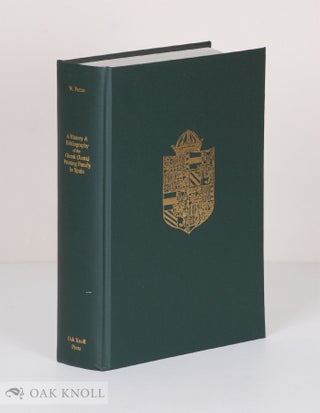New Castle, DE: Oak Knoll Press, 2005. 8.5" x 11" cloth, hardcover. 1086 pages. The first edition of this monumental work opens with a 170 page history of the Giunti publishing family that covers their achievements in Italy, Spain and France from 1489 to 1628. As the great rivals of the Aldine Press, the Giunti aggressively captured large portions of the lucrative governmental and Church's printing business. From their base in Florence and Venice, family..... READ MORE
Price:
$200.00
other currencies
Order nr. 77561
Introduction
Nearly a century ago, in his book on Spanish and Portuguese printers' marks of the fifteenth and sixteenth centuries, Konrad Haebler wrote
briefly about the Junta family of printers. His comments provide an early bibliophile's description of the Junta family in Spain, beginning
with the first known imprint of the house, dated 15 May 1526, published in Burgos. But some of Haebler's statements are inaccurate, based
mainly on statements made in the Junta publications themselves and on similarities of the type fonts and illustrations to those used by other
printers. Like most bibliographers of his time, he did not concern himself with the social and economic aspects of publishing. Crist6bal
Perez Pastor, a Spanish bibliographer who produced catalogues of publishing in Madrid, Medina del Campo and Toledo from the 1890s to the earl
years of this century, made an important contribution by collecting a large number of documents relating to the book trade and the lives of
Spanish printers, publishers and writers. These documents, many of which are related to the activities of the Junta firms, he summarized,
paraphrased or included verbatim in his catalogues. About the same time, the work of the French bibliographer Henri Baudrier added much to
our knowledge of the Giunti firm in Lyon by identifying early editions of publishers there and reproducing primary documents. In Italy, the
early twentieth-century catalogue of Decio Decia on the Giunti firm in Florence was refined and expanded by Renato Delfiol and Luigi Camerini
and the work of Paolo Camerini and Alfredo Cioni has done much the same for the Giunti firms in Venice. In recent years, interest in early
printing and publishing has expanded, and scholars such as Natalie Z. Davis, Elizabeth Eisenstein, Paul Grendler, Clive Griffin and Sara
Nalle have opened new horizons with perceptive studies dealing with the social issues connected with publishing. And in Spain, the ambitious
program of publishing bibliographic catalogues for the production of individual cities has already resulted in work of a high standard by
bibliographers such as J. Martin Abad and L. Ruiz Fidalgo. The following introduction seeks to examine what is known about the Junta family
in Spain and to relate their story to those of other branches of the family in Venice, Florence, Rome and Lyon.

